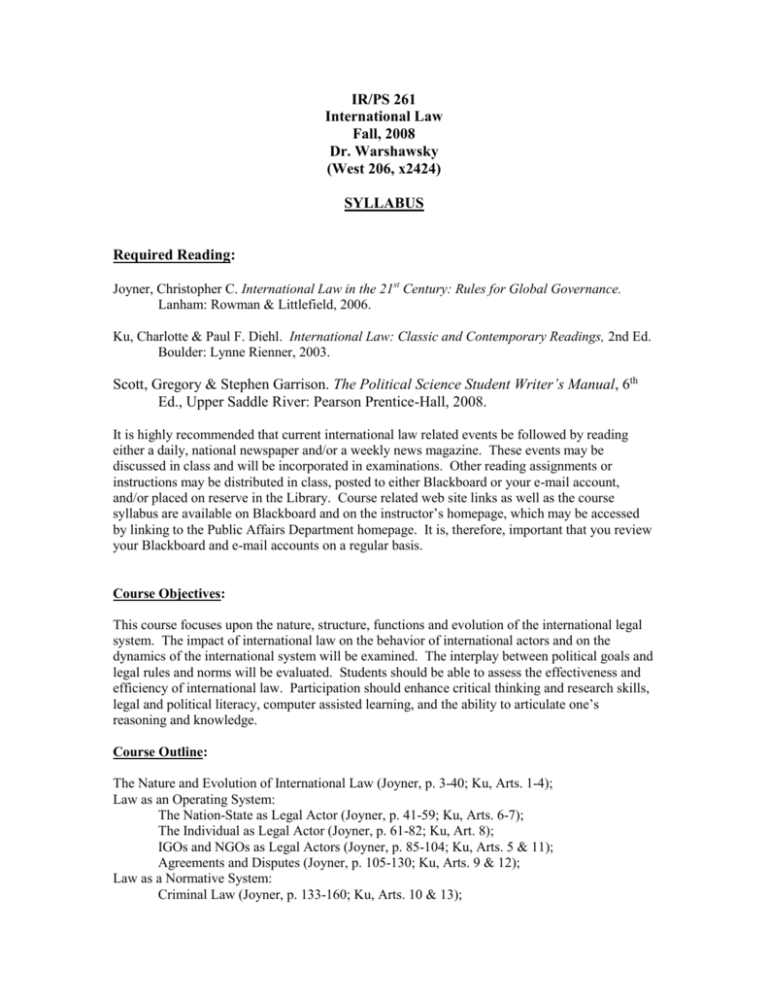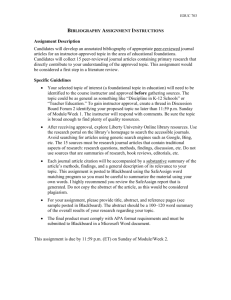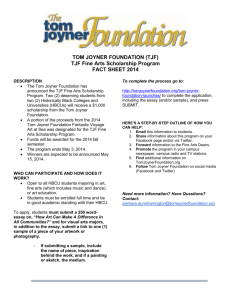
IR/PS 261
International Law
Fall, 2008
Dr. Warshawsky
(West 206, x2424)
SYLLABUS
Required Reading:
Joyner, Christopher C. International Law in the 21st Century: Rules for Global Governance.
Lanham: Rowman & Littlefield, 2006.
Ku, Charlotte & Paul F. Diehl. International Law: Classic and Contemporary Readings, 2nd Ed.
Boulder: Lynne Rienner, 2003.
Scott, Gregory & Stephen Garrison. The Political Science Student Writer’s Manual, 6th
Ed., Upper Saddle River: Pearson Prentice-Hall, 2008.
It is highly recommended that current international law related events be followed by reading
either a daily, national newspaper and/or a weekly news magazine. These events may be
discussed in class and will be incorporated in examinations. Other reading assignments or
instructions may be distributed in class, posted to either Blackboard or your e-mail account,
and/or placed on reserve in the Library. Course related web site links as well as the course
syllabus are available on Blackboard and on the instructor’s homepage, which may be accessed
by linking to the Public Affairs Department homepage. It is, therefore, important that you review
your Blackboard and e-mail accounts on a regular basis.
Course Objectives:
This course focuses upon the nature, structure, functions and evolution of the international legal
system. The impact of international law on the behavior of international actors and on the
dynamics of the international system will be examined. The interplay between political goals and
legal rules and norms will be evaluated. Students should be able to assess the effectiveness and
efficiency of international law. Participation should enhance critical thinking and research skills,
legal and political literacy, computer assisted learning, and the ability to articulate one’s
reasoning and knowledge.
Course Outline:
The Nature and Evolution of International Law (Joyner, p. 3-40; Ku, Arts. 1-4);
Law as an Operating System:
The Nation-State as Legal Actor (Joyner, p. 41-59; Ku, Arts. 6-7);
The Individual as Legal Actor (Joyner, p. 61-82; Ku, Art. 8);
IGOs and NGOs as Legal Actors (Joyner, p. 85-104; Ku, Arts. 5 & 11);
Agreements and Disputes (Joyner, p. 105-130; Ku, Arts. 9 & 12);
Law as a Normative System:
Criminal Law (Joyner, p. 133-160; Ku, Arts. 10 & 13);
Use of Force, Human Rights and Humanitarian Intervention Law (Joyner, p. 161-196;
Ku, Arts. 14-15 & 17);
Environmental Law (Joyner, p. 197-221, Ku, Arts, 18-20);
Global Commons Law (Joyner, p. 223-251; Ku, Arts. 21-22);
Economic Law (Joyner, p. 253-283; Ku, Art. 16);
The Future of International Law (Joyner, p. 287-295; Ku, Art. 23).
Grading and Course Policies:
Overall course grades will be based upon formal grades for: two (2) essay examinations (20%
each), a research paper (20%) [17% for the written paper; 3% for the outline and bibliography];
participation in a mock ICJ trial (20%), and a final examination (20%), as well as upon an
evaluation of in-class attendance and participation. The scope of the research paper, the nature
and dates of the exams, and the conduct of the mock trial will be discussed in class. Information
relevant to all grading instruments will also be posted on Blackboard.
Each student is allowed up to two absences (regardless of cause) without formal penalty. For
each additional absence, one (1) point will be deducted from the overall course grade.
Absences, therefore, will have a negative influence upon overall course grades and all students
are expected to attend class regularly. Absence from examinations or scheduled presentations
without prior permission by the instructor will result in a grade of “0”. No make-up
examinations will be given. Additional research papers will be utilized to replace any exams
missed due to an excused absence.
Academic integrity is expected and required. Enrollment constitutes acknowledgement of the
rules and standards pertaining to academic integrity at Roanoke College. Students are expected
to read and be aware of the principles and rules in the College Academic Integrity Handbook.
Students whose absences seem to be contributing to unsatisfactory performance may receive a
formal warning concerning this problem; continued absences after such warning will cause the
instructor, in conformance with College policies, to drop the student from the course with a
failing grade (“DF”).
Students are encouraged to consult with the instructor, especially if they are encountering
difficulty with or have questions about course content or assignments. Questions/issues may be
raised in class, during scheduled office hours, or at other times arranged by appointment. In-class
participation in discussion of issues is expected.
Electronic Devices:
Cell phones and pagers must be turned off prior to entering the classroom. The use of any
electronic device during a quiz or exam is strictly prohibited. Any use of such devices during a
quiz or exam will be considered a breach of academic integrity. No electronic devices may be
used in class at any time without permission of the instructor.
Special Academic Needs:
If you are on record with the College’s Office of Special Services as having special academic or
physical needs requiring accommodations, please discuss this with me as soon as possible. We
need to discuss your accommodations before they can be implemented. Also, please note that
arrangements for extended times on exams and testing in a semi-private setting must be made at
least one week before the exams.
If you believe you are eligible for accommodations but have not yet formally contacted Special
Services, contact the Center for Learning and Teaching (x2247).
Research Paper Guidelines
The research paper (10-12 typed, double-spaced pages, exclusive of bibliography) will
focus upon a description and analysis of how and why international law has evolved in
regard to a specific topical issue. The analysis should incorporate an explanation of the
international problem/issue, the nature of customary practice towards the issue, the
evolution of rule-making and regime formation relevant to the issue, and an evaluation of
the impact of international law on this issue. A thesis statement, providing your
hypothesis as to why international law relevant to the issue is in its currents state, must be
incorporated into both the initial outline and completed paper.
The following is a list of potential topical issues for your consideration (but is not an
exclusive list). Each student will focus on a distinctly different topic. Therefore, when
submitting topic proposals, you should include at least 3-5 issues in ranked order of
preference:
Use of force issues (e.g. aggression; genocide; war crimes; self-defense; treatment of
prisoners of war);
Criminal behavior (e.g. piracy; slavery; skyjacking; cyber crime; counterfeiting);
Environmental issues (e.g. ozone depletion; global warming; transport of hazardous
wastes; air or water pollution);
Legal status issues (e.g. treatment of diplomatic personnel; recognition of territorial
claims; recognition of governments; IGO, NGO or individual person legal rights
and obligations; treatment of aliens; status of refugees or immigrants);
Global commons issues (e.g. law of the sea; threats to navigation; activities in space or
the Arctic);
Arms control issues (e.g. WMD; land mines; small arms; nuclear free zones);
Economic issues (e.g. trade, banking or currency regulations; harmonization of
production standards; legality of economic sanctions; intellectual property rights).
Papers must be submitted electronically utilizing the “Safe Assignment” process on Blackboard.
Research notes and drafts should be used and retained and must be made available at the request
of the instructor for possible review. The instructor may also require that poorly researched or
written papers be re-written prior to the assignment of paper and course grades. All papers must
include text notes and a bibliography. The Scott & Garrison text must be used as a guide for
citations, research, and stylistic format. All work must be original for this course. Failure to
meet any of these requirements as well as failure to quote or cite sources properly constitute a
violation of academic integrity. Students should review the relevant sections of the College
Academic Integrity Handbook. Consult the instructor if there are any questions regarding the
research for or writing of the paper.
One point will be deducted from the overall paper grade for each day that the topic proposal or
outline and bibliography is overdue. Two points will be deducted for each day the completed
paper (including all materials required for submission) is overdue. The outline/bibliography
assignment will be graded separately. Preparing a comprehensive, well ordered outline is an
important start towards attaining a good overall paper grade. It must include a clear thesis
statement.
Students should consult with the instructor at all stages of the research and writing process.
Questions about the scope of the topic, methods of research, and writing style should be clarified
as soon as possible in order to produce a coherent, comprehensible analysis.
Choice of topics is due:
September 10
Preliminary extended outline
and bibliography is due:
October 6
Completed Paper is due:
November 24
No papers will be accepted later than December 1. Failure to submit all required materials
by this date will result in a grade of “0”.






